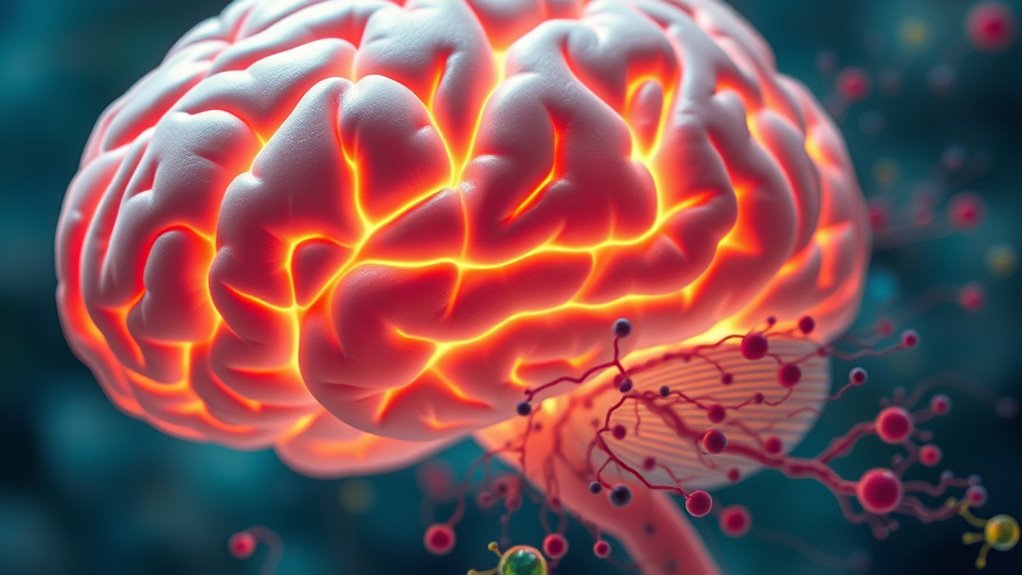Your gut microbiome actively influences your mental health by sending chemical signals through the gut-brain axis. It produces neuroactive compounds like serotonin, dopamine, and GABA, which impact your mood and emotions. These signals travel via the vagus nerve, immune system, and bloodstream, shaping how you perceive stress and process feelings. Maintaining a balanced, diverse microbiome supports mental resilience. Exploring further reveals how lifestyle choices can optimize this essential connection.
Key Takeaways
- The gut microbiome communicates with the brain via neural, immune, and chemical pathways, influencing mental health and emotional well-being.
- Microbial-produced neuroactive compounds like serotonin and GABA regulate mood, cognition, and stress responses.
- An imbalance in gut bacteria can disrupt neurochemical signaling, leading to increased inflammation and mental health issues such as anxiety and depression.
- Healthy microbiome diversity supports resilient communication pathways, promoting mental stability and emotional resilience.
- Lifestyle factors like diet, probiotics, and stress management can optimize microbiome balance, positively affecting mental health outcomes.

The gut-brain axis is a complex communication network that links your digestive system and brain, allowing them to influence each other directly. At the heart of this connection is microbial signaling, a process through which your gut microbiome communicates with your nervous system. These tiny organisms produce and respond to various chemicals, sending signals that can impact your mood, cognition, and overall mental health. When your gut bacteria release neurochemical pathways, they can activate or modulate your nervous system, influencing everything from stress levels to emotional well-being. Understanding this connection reveals how your gut bacteria are not just passive inhabitants but active players in shaping your mental state. Microbial signaling involves the production of neuroactive compounds by your gut microbiota, such as neurotransmitters like serotonin, dopamine, and gamma-aminobutyric acid (GABA). These chemicals are vital for brain function, and their presence in the gut means they can influence your mood and mental clarity. For example, about 90% of your body’s serotonin is produced in your gut, and fluctuations here can directly impact your feelings of happiness or anxiety. These neurochemical pathways act as messengers, transmitting signals from your gut bacteria to your brain through various routes, including the vagus nerve, immune system modulation, and circulatory systems. This means that the state of your microbiome can markedly alter how your brain perceives stress, processes emotions, or even how alert or fatigued you feel. When your gut microbiome is balanced, it fosters healthy microbial signaling, supporting stable neurochemical pathways that promote mental resilience. Conversely, imbalances—such as those caused by poor diet, antibiotics, or stress—can disrupt these signaling pathways. This disruption can lead to increased inflammation or altered neurotransmitter production, both of which have been linked to mental health issues like depression and anxiety. The more you learn about these processes, the clearer it becomes that nurturing your gut microbiome through diet, probiotics, and lifestyle choices can have profound effects on your mental well-being. Additionally, emerging research suggests that microbial diversity plays a crucial role in maintaining optimal communication within the gut-brain axis.
Frequently Asked Questions
Can Probiotics Improve Mental Health Symptoms?
Probiotics can potentially improve mental health symptoms by promoting a healthy microbiome. Microbiome therapy aims to restore balance in your gut bacteria, which may positively influence mental health outcomes. When you incorporate probiotics into your routine, you’re supporting this therapy, and it could help reduce anxiety, depression, or stress. While results vary, many find that maintaining a healthy gut microbiome contributes markedly to better mental well-being.
How Quickly Can Microbiome Changes Affect Mood?
When considering microbiome timing and mood shifts, you might wonder how fast changes in your microbiome can influence your mood. Typically, it can take days to a few weeks for microbiome adjustments to affect mood profoundly. Your gut bacteria interact with your nervous system, so consistent dietary changes or probiotics may lead to noticeable mood shifts within this timeframe. Patience is key, as your microbiome gradually adapts and impacts your mental health.
Are There Specific Foods That Enhance the Gut-Brain Connection?
Think of your gut as a busy city, where fermented foods and dietary fibers act like essential infrastructure supporting lively communication. Eating fermented foods like yogurt and sauerkraut boosts beneficial bacteria, while dietary fibers from fruits, veggies, and whole grains fuel their growth. These foods strengthen your gut-brain connection, improving mood and mental health. Incorporate them into your daily meals to nurture this crucial link and enhance overall well-being.
Does Stress Impact Gut Microbiome Diversity?
Stress effects your gut microbiome by reducing its diversity, making it less resilient to changes and disturbances. When you’re stressed, your microbiome’s resilience weakens, leading to potential imbalances that can affect your overall health. To maintain a healthy microbiome, manage stress through relaxation techniques and a balanced diet. Keeping your gut resilient helps support your mental health and overall well-being.
Can Gut Health Influence Neurodegenerative Diseases?
You might think brain health is all in your mind, but surprisingly, your gut health plays a role. Yes, gut inflammation and microbiome genetics can influence neurodegenerative diseases. When your gut’s in trouble, it can send signals that worsen brain conditions, highlighting the unlikely connection between your gut and mind. So, caring for your gut isn’t just about digestion—it’s about protecting your brain’s future.
Conclusion
You might be surprised to learn that nearly 90% of your body’s serotonin is produced in your gut, highlighting how closely your mental health is linked to your microbiome. This gut-brain axis shows that nurturing your gut through diet and lifestyle can profoundly impact your mood and overall well-being. Remember, taking care of your microbiome isn’t just about digestion—it’s about supporting your mental health too. Your gut truly holds the key to a happier, healthier mind.










